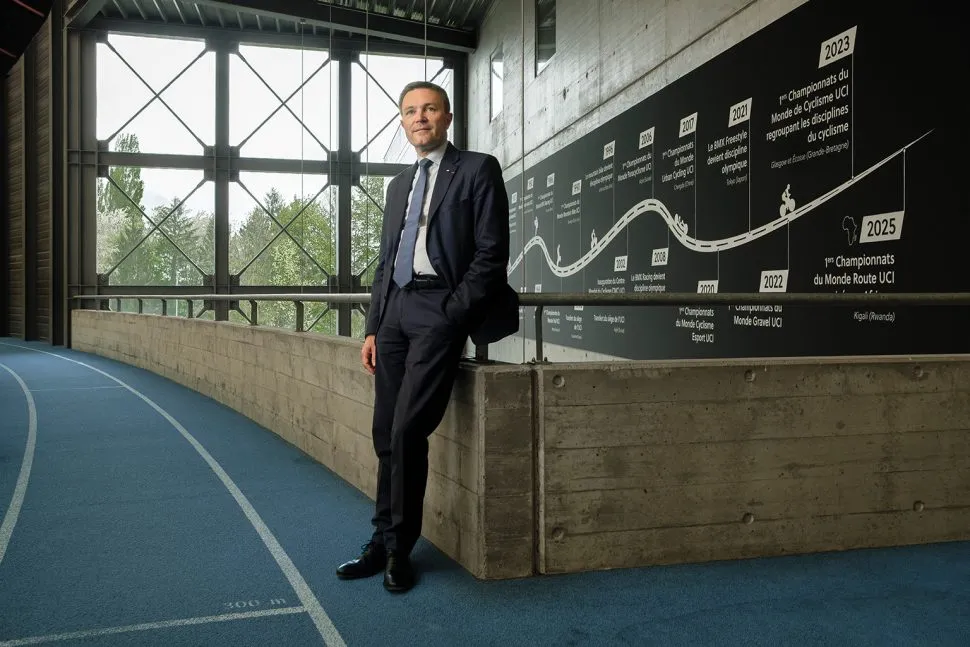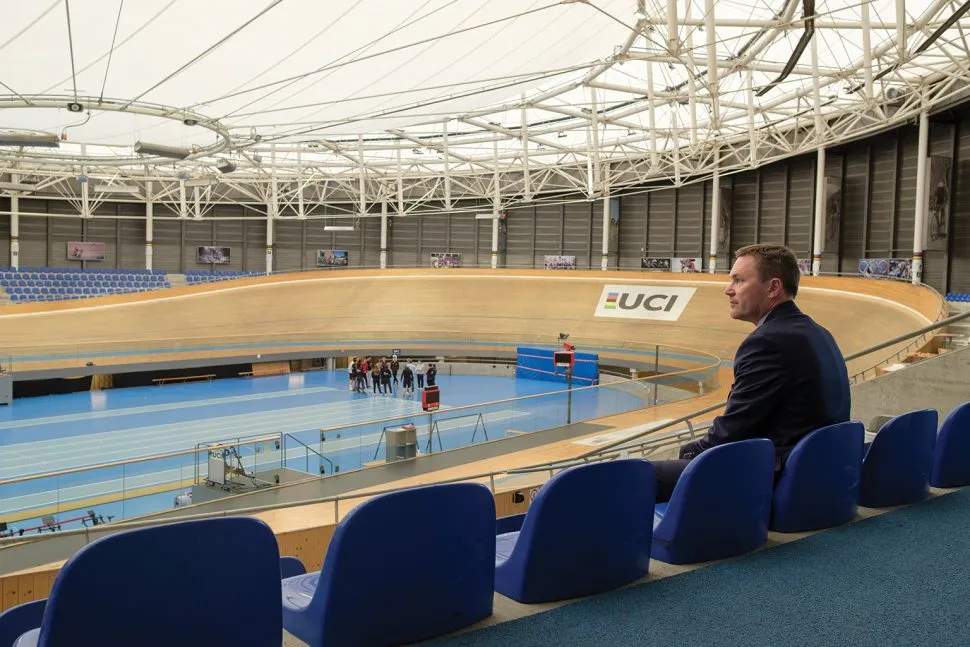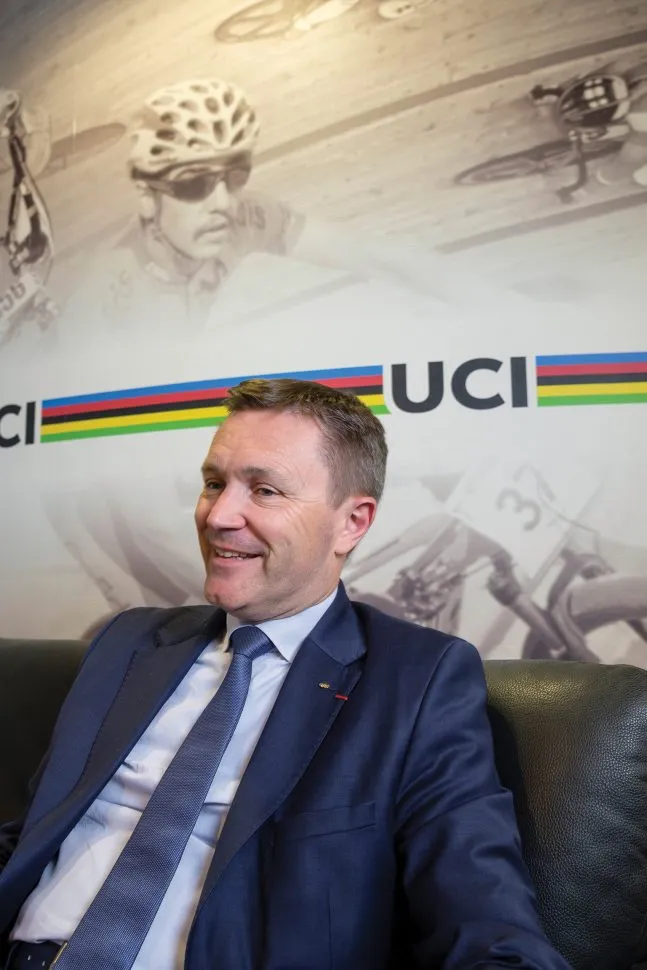Cyclist
‘I would’ve been sad to leave the UCI’: David Lappartient interview
David Lappartient breezes into his office at UCI headquarters in Aigle, slaps a folder of paperwork on his desk and allows himself a wry smile when he’s asked about his failure in the recent International Olympic Commitee presidential race.
‘It wasn’t exactly according to my wishes,’ he shrugs. ‘But I’m happy to work with the new leadership.’
The UCI’s front man had been widely expected to come close to getting sport’s top job, but unusually for an experienced actor in sports governance, who was deemed a strong candidate and who is used to winning elections, it didn’t work out. He’d answered the call when the Paris Olympics had been in disarray; he’d been an influential advocate for the rebirth of the women’s Tour de France as the Tour de France Femmes; he’d increased the vigilance of technological fraud in cycling; he’d even assisted in the rescue of refugees from Afghanistan. But it wasn’t enough.
In the end he got four – yes, four – of the 97 votes, as Zimbabwean Kirsty Coventry swept into the IOC presidency. At least the Frenchman knows that he will doubtless win another term as UCI president when those elections, in which he expects again to stand unopposed, come around.
We speak towards the end of the spring Classics, in which a fan threw a bidon at Matthieu van der Poel during Paris-Roubaix and a rogue spectator joined the women’s peloton from the side of the road during the closing moments of Liège-Bastogne-Liège.
‘All these cases are clearly unacceptable,’ Lappartient says. ‘Together with the different cycling families – organisers, teams, riders – we fully condemn what has happened. But when you have millions of people along the roads, at all the races in the world, there can always be crazy people or drunks. Sometimes the fans don’t always like riders who win a lot of races.’
He points out that, unlike stadium sports, cycling is almost impossible to control and those intent on being disruptive can appear at the roadside and then quickly melt away into the crowds.

‘It has to be clear that we will take people to court. Also, the other fans can be useful by showing positive behaviour.’
He recalls the climate activist group, Dernière Rénovation, who attempted to glue themselves to the road during the 2022 Tour de France.
‘They started to glue themselves but immediately the other fans threw them off the road. I don’t expect the fans to be the police, but this shows how it can help, if the fans also ensure that it’s safe.’
The mounting toll
There is another side to rider safety, a darker side, in which race incidents have led to the deaths of Gino Mäder, Muriel Furrer and André Drege in the past couple of years. Could more have been done?
‘It’s not an easy topic, and there are still a lot of improvements we could make,’ says Lappartient. He highlights what he calls ‘easy’ propositions, saying, ‘If it was so easy, we would have found that solution together. But this is something that has changed – the desire to work together. That’s because the situation is becoming more and more complicated.’
Lappartient fuelled some bitterness last year when he suggested that riders bore the responsibility for a lot of crashes. His comment that ‘50% of the crashes’ are down to what he called the ‘attitude’ of the riders even drew a response from Ineos Grenadiers owner Jim Ratcliffe.
‘Cyclists are always going to push things to the limit as they are elite sportsmen,’ Ratcliffe chided him, before urging Lappartient to ‘ensure the safety of the sport’.
His team leader, Geraint Thomas, was more direct, saying, ‘Lappartient needs to focus more on the 50% he can affect – 50% is still down to him and organisers to do everything they can.’
Now Lappartient is keen to elaborate a little further: ‘Equipment is better than ever, the bikes are faster than ever. It has always been like this but over the last few years there has been a greater evolution with tyres, wheels, frames…’

It’s not just down to the equipment, though. As Thomas recently pointed out, ‘Everyone is just stronger. Everyone is training better, the whole peloton is getting better. Before, it was just a couple of people in every team going to altitude or whatever, but now it’s whole teams that are on it.’
Lappartient doesn’t disagree: ‘Globally the speed is clearly increasing. In the past five years I think we have gained 1.8kmh average speed in WorldTour racing, which is huge.’
It hasn’t gone unnoticed, Lappartient says, that aerodynamics also hugely influence racing stability: ‘The handlebars are becoming narrower and narrower. We have to stop this. The purpose of the handlebar is to steer the bike.’
But surely it’s not all on the riders and technology. What about the problems at smaller races, such as the 2025 Étoile de Bessèges, in which lax security allowed oncoming traffic to repeatedly impede the peloton?
‘There are more and more obstacles on the roads. It’s a reality. People want to reduce the speed of cars, which is good, but in the meantime bike races are getting faster and faster on roads designed to reduce speed.’
What can be done?
All of the above is true, but it’s also true that Mäder, Furrer and Drege did not die because of traffic calming.
‘The race organisers, believe me, are doing their best. I don’t know a single organiser who wants to have an accident in their own race,’ says Lapparient. ‘They are investing more and more in safety and security.’
He does accept, though, that for a few of them ‘the organisation is not completely available’, by which he means budget: ‘Some of them were not included in the calendar anymore, some were relegated to another category, some were fined. If you’re fined or relegated you have to allow an observer from the UCI to come.’
He argues that it’s not easy for organisers of lesser races that have nowhere near the power of the Tour.
‘They do the reconnaissance and then, a week or two before the race, they discover new obstacles. There is more and more of this, so I will not blame the organisers. Everybody has their own share of the responsibility.’
Furrer’s death, in the UCI’s Road World Championships last year, in which she ‘disappeared’ unnoticed mid-race, sent shockwaves through the sport. For some, it was a tipping point.
‘It was a disaster,’ Lappartient says. ‘It was a huge tragedy and of course we all support her family. The investigation is still ongoing to understand the cause of the accident and we are still awaiting the conclusions.’

A police investigation into Furrer’s death, he says, has yet to conclude: ‘I don’t know when exactly they will produce a report but we will discuss how we can avoid this in future and what lessons there are from what happened.’
Lappartient says there have also been discussions about what role technology could play in preventing anything similar from happening again.
‘Maybe we can have GPS tracking that warns when a rider is not moving for all WorldTour events.’
The cost of that innovation, he says, is in the region of €600,000, or €1.2 million if GPS tracking were to be introduced in both men’s and women’s WorldTour racing.
‘It would enable us to see where they are if they have a crash,’ he says, but adds that the teams, organisers and UCI need to agree on how the cost is shared out.
Discussions aside, Lappartient knows that professional cycling is at a crossroads. When Formula 1 legend Ayrton Senna was killed at Imola in May 1994, his death prompted a significant overhaul in the culture of motor racing safety.
‘I remember, I saw it happen on my TV,’ Lappartient says of the Brazilian’s death. ‘I think we have already started to change our own culture. For example, after the crash in the Tour of Poland [Fabio Jakobsen in 2020] the barriers and fences were modified. We have done a lot. Many things are now mandatory under the regulations.’
Lappartient also believes that, for example, most helmet designs are not appropriate for current racing speeds and need to be certified by the UCI for elite racing conditions.
‘They may be good for aerodynamics, but are they good to protect the riders? That’s the first role of a helmet.’
The Rwanda problem
It’s hard being the leader of an international sports federation when geopolitics are so unstable, conflict so widespread. From Ukraine to Kashmir, Sudan to Gaza, the business of globalisation can be fraught with unexpected pitfalls, as Lappartient has learned.
‘The world is more and more complicated and the geopolitical situation is getting worse and worse,’ he says. ‘We have to navigate this situation.’
The choice of Rwanda for the 2025 UCI Road World Championships, the first to be staged in Africa, has fuelled controversy, because of Rwanda president Paul Kagame’s record on human rights and because of a recent incursion into the neighbouring Democratic Republic of Congo.

Lappartient says that he has raised these points with Kagame but maintains that there is no ‘Plan B’ to move the Worlds to a back-up location.
‘We had discussions about the ongoing situation,’ he says of recent meetings with Kagame. ‘We are confident that the situation will be under control. Our mission is to be politically neutral but to call for peace. It’s also to make sure we are not used for political reasons.’
Lappartient describes the situation as ‘complicated’.
‘It’s not as simple as you sometimes read. We are always very careful about the way that we can be used, but in Rwanda you can really feel the support for President Kagame. He brings people back together.’
Sport, Lappartient believes, is a force for uniting people, not fuelling division.
‘It’s a bit of blue sky on a grey day,’ he says. ‘I believe the right thing to do is to go to Rwanda. We have never been to Africa. We knew there would be challenges but we will have wonderful races, wonderful images worldwide.’
Meanwhile the spiralling costs, as well as the local unrest, have been a concern for some federations, with several, including the Belgian federation of Olympic champion Remco Evenepoel, delaying a final decision until things improve.
‘Rwanda is a safe country,’ Lappartient insists. ‘We don’t have any issues with security. Belgium has raised some concerns but I can tell you that the costs will be under a certain limit and acceptable for their national federations.’
Time, as ever, will tell. In the meantime, Lappartient will resume his plan to continue as UCI president for a third term.
‘I’m not tired,’ he says defiantly. ‘There are still plenty of plans. I would have been sad to leave the UCI.’

Lappartient on…
…OneCycling and investment from Saudi Arabia
‘We had discussions with OneCycling and the Saudis and welcome any investors who want to be part of cycling. The economic model can be improved, but it’s not easy to bring all the stakeholders together. We are an old sport so it’s not so easy to change, but the potential for cycling is huge.’
…differences between the UCI and Tour owner ASO
‘If you don’t work together there is no solution, so I don’t want that. I have a good relationship with ASO, but a fight with ASO would be suicide for cycling. They have more than 60% of the global audience of cycling, so if you pick a fight with them, be sure you are strong enough.’
…whether the Tour can be part of OneCycling in the future
‘As long as ASO continue, they will be very careful. They don’t want to join a private league. A breakaway league is not in their philosophy of the sport and we are aligned on that. But I think we are not far away from having a positive evolution.’

The post ‘I would’ve been sad to leave the UCI’: David Lappartient interview appeared first on Cyclist.




















